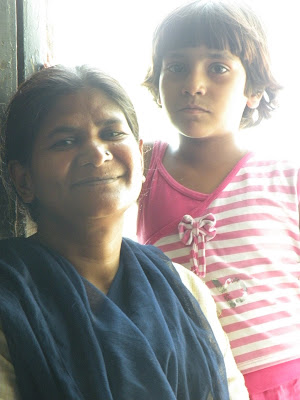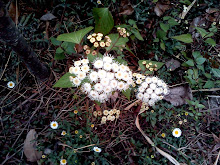
I met Najma ba'aji in October 2008 during a one day workshop with a group from Seelampur Basti. She was accompanying a group of seventy teenage girls on a picnic they had to Qutb-Minar. After the workshop was over, I hitched a ride with the group. The bus was full of energy and excitement. Nothing, not the two o' clock afternoon heat or chaos of the streets was a hindrance to the amount of fun the collective had decided to have that day!
Najma ba'aji and I were sitting together and in that twenty minute ride she hurriedly told me her story, with an openness that was unique and a confidence that was inspiring.
In the last few weeks through the course of a project "A Journey to Find Our Freedom Songs", I've been visiting the New Junta School in Junta Colony, Seelampur regularly. I often bump into Najma ba'aji at the center and haven't helped but notice that when she walks in to the center there's just a flicker of discomfort in the form of silence and cold stares. While the girls are civil they definitely are not happy to see her. But she is least bothered. She comes in and observes our sessions, talks to the girls, at times takes on a self-appointed role of matron with her "matronly" advice. But she is always quick to add, "I have suffered enough. Learn from my story..." obviously the sort of thing that most upsets teenagers anywhere.
She was forcibly married off at a very young age. After having been continuously harassed by her in-laws for more dowry she returned to her village near Chandigarh. Her mother could offer her no shelter, only sympathy for her "sorry fate" and the advice that she should return to her husband's home and get used to his violence and harassment. Today, when she spoke of this incident to me, there was a slight tremor in her voice and some regret. She was hurt then that her parents turned their backs on her when she needed them. At the time she could only react by saying that she would never return to their house again. But neither did she go back to her husband's house. Instead she made her way to Delhi. Here she soon married another man, in the hope of some security. Her second husband was a smack addict and being unable to cope with his addiction she too got hooked on to the drug. She did smack for fourteen years. After her husband died, she chose to be part of a rehabilitation program run by an NGO in Seelampur. She has been off the drug for the last five years. In this time she met Ahmed bhai and married him. He plies a rickshaw for school children. He's also been active with AITUC in Seelampur. While she has been working with an NGO as an HIV/AIDS peer officer in the area. She talks to women about HIV/AIDS, encourages them to get tested. She provides the first level of support through counseling to women who have tested positive and helps them to access medical treatment. Her role in the community is obviously not a very popular one. She faces immense amount of pressure from both men and women. She openly shares her own life experiences with young girls who face high risks in the area and continuously talks to them about the importance of finishing their education and finding means to be economically independent. Her work isn't easy under the circumstances and many young girls are told not to speak with her by their family members.
Najma ba'aji and I were sitting together and in that twenty minute ride she hurriedly told me her story, with an openness that was unique and a confidence that was inspiring.
In the last few weeks through the course of a project "A Journey to Find Our Freedom Songs", I've been visiting the New Junta School in Junta Colony, Seelampur regularly. I often bump into Najma ba'aji at the center and haven't helped but notice that when she walks in to the center there's just a flicker of discomfort in the form of silence and cold stares. While the girls are civil they definitely are not happy to see her. But she is least bothered. She comes in and observes our sessions, talks to the girls, at times takes on a self-appointed role of matron with her "matronly" advice. But she is always quick to add, "I have suffered enough. Learn from my story..." obviously the sort of thing that most upsets teenagers anywhere.
She was forcibly married off at a very young age. After having been continuously harassed by her in-laws for more dowry she returned to her village near Chandigarh. Her mother could offer her no shelter, only sympathy for her "sorry fate" and the advice that she should return to her husband's home and get used to his violence and harassment. Today, when she spoke of this incident to me, there was a slight tremor in her voice and some regret. She was hurt then that her parents turned their backs on her when she needed them. At the time she could only react by saying that she would never return to their house again. But neither did she go back to her husband's house. Instead she made her way to Delhi. Here she soon married another man, in the hope of some security. Her second husband was a smack addict and being unable to cope with his addiction she too got hooked on to the drug. She did smack for fourteen years. After her husband died, she chose to be part of a rehabilitation program run by an NGO in Seelampur. She has been off the drug for the last five years. In this time she met Ahmed bhai and married him. He plies a rickshaw for school children. He's also been active with AITUC in Seelampur. While she has been working with an NGO as an HIV/AIDS peer officer in the area. She talks to women about HIV/AIDS, encourages them to get tested. She provides the first level of support through counseling to women who have tested positive and helps them to access medical treatment. Her role in the community is obviously not a very popular one. She faces immense amount of pressure from both men and women. She openly shares her own life experiences with young girls who face high risks in the area and continuously talks to them about the importance of finishing their education and finding means to be economically independent. Her work isn't easy under the circumstances and many young girls are told not to speak with her by their family members.
Even though she hasn't taken any sort of drugs in the last five years Najma ba'aji says that for her to stay off the drugs is a daily battle. Apart from the many repercussions of repeated abuse, on her health now, she also worries about the anger within her that has long been repressed and what may happen if she couldn't control it someday. She is absolutely clear that she's been a victim of the world and its "social order" for too long now, to care anymore what others think of her. She thanks Allah, for another chance at life. She recalls the names of people, who were once fellow addicts, who didn't make it or have long since disappeared without anyone bothering to look for them. She believes the reason she has been given this new lease of life is because she has some important work left to do and that her involvement with the women in the community of Seelampur is that work. Despite the irritable teenagers, who don't want any advice and are rarely grateful for her help, she continues to be there. Cracking jokes, never mincing any words, always welcoming, independent, radiating an invincibility that is at once reassuring and yet mysterious, Najma ba'aji is one of the most inspiring women I have ever met. And I am sure that the young girls whose lives she affects today will also say the same thing of her, some day, many years from now.

thats one inspiring story.i think she is one strong woman to get out of the drug. its really very tough..
ReplyDelete